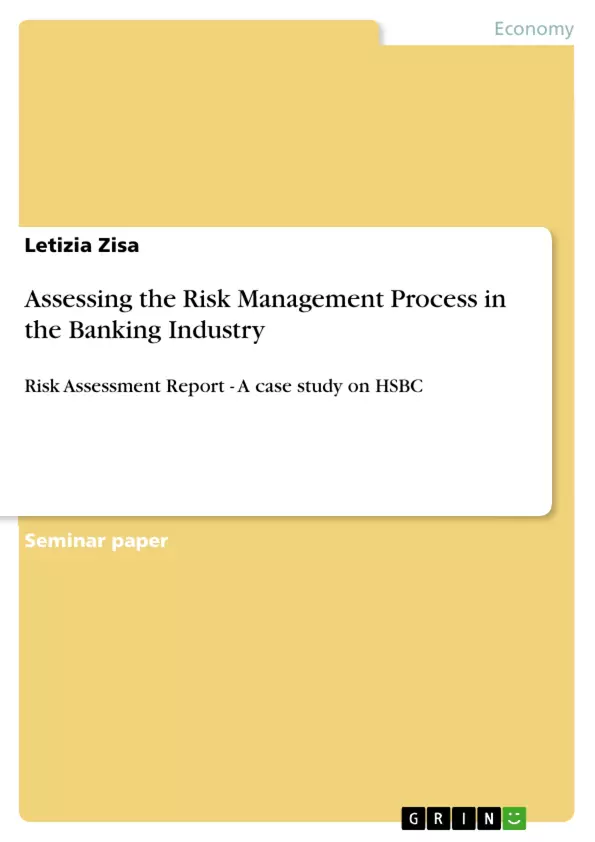Risk is inevitable within business environments. It is an inherent part of business and public life. Risk covers all aspects of organizational activities, therefore it is included in all management levels. Nowadays, every business faces risks. As competition increases, banks and insurance companies need a fundamental and clear understanding of all the risks they are taking in order to protect every asset of their organisation, such as financial, intellectual and human assets. In an ever changing environment organisations must be prepared to any changes, whether they like it or not, and more importantly, adapt to all those changes that might threaten their business activities. Organisations must be prepared that the uncertainty and the risk of a potential event cannot be eliminated but must be assessed proactively in order to take advantage of it. “Nothing ventured, nothing gained” (Dallas, M.F., 2006, p.37).
Table of Contents
- 1. Introduction
- 1.1 Nature of Risk Management
- 1.2 Concepts and Definitions
- 1.3 Part I - Process of Risk Management
- 1.3.1 Establishing the Context
- 1.3.2 First Step - Risk Identification
- 1.3.3 Second Step - Risk Assessment
- 1.3.4 Third Step - Address Risk
- 1.3.5 Reviewing Risks
- 2. Part II - Generic Types of Risks
- 2.1 Brand Risks
- 2.2 Customer Risks
- 2.3 Reputational Risks
- 2.4 Research & Development Risk
- 2.5 P.E.S.T.L.E. Risks
- 3. Part III-Risk Assessment of HSBC
- 3.1 Credit Risk
- 3.2-3.4 Liquidity/Market/Operational Risks
- 3.5 Reputational Risk
- 3.6 Further Risk factors for the bank sector
- 4. Part IV - HSBC's Business Strategy
- 4.1 VaR
- 4.2 Basel II
- 4.3 Risk Register
- 4.4/4.5 Strategic Alliances/ Insurance
- 4.6 Reputational Risk Strategy
Objectives and Key Themes
This risk assessment report aims to provide a comprehensive overview of the nature of risk management and its application within the context of HSBC. It examines the generic types of risks faced by businesses and analyzes the specific risks faced by HSBC. The report explores various strategies for mitigating and managing these risks, focusing on HSBC's business strategy.- Nature and process of risk management
- Identification and analysis of generic business risks
- Risk assessment of HSBC, particularly reputational risks
- HSBC's business strategy for managing and mitigating risks
- Strategic alliances and risk register as risk management tools
Chapter Summaries
- Chapter 1: Introduces the concept of risk management, emphasizing its importance in today's competitive business environment. It defines key terms and outlines the process of risk management, including risk identification, assessment, addressing, and reviewing.
- Chapter 2: Discusses various generic types of risks that businesses commonly face, including brand, customer, reputational, R&D, and PESTLE risks. It explores the potential impact of these risks on business operations.
- Chapter 3: Analyzes the specific risks that HSBC faces, highlighting reputational risk as a significant concern. It discusses the need to minimize reputational risks to maintain customer loyalty.
- Chapter 4: Outlines HSBC's business strategy for managing and mitigating risks. It explores various tools and approaches, including VaR, Basel II, risk registers, strategic alliances, and insurance.
Keywords
This report focuses on key concepts related to risk management in a banking context, particularly for HSBC. It examines various types of risks, including brand, customer, reputational, R&D, and PESTLE risks. The report further explores risk assessment methodologies, strategies for managing risks, and tools such as VaR, Basel II, risk registers, and strategic alliances.- Quote paper
- Letizia Zisa (Author), 2010, Assessing the Risk Management Process in the Banking Industry, Munich, GRIN Verlag, https://www.hausarbeiten.de/document/171347


